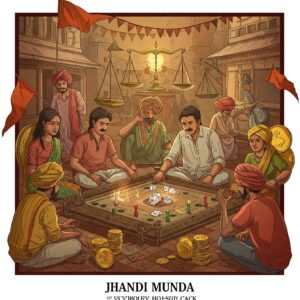
Jhandi Munda, a traditional dice game originating from the Indian subcontinent, is more than just a pastime. It is a cultural phenomenon that has been passed down through generations, often played during festivals and family gatherings. The game, which involves six dice with unique symbols, is not merely a test of luck but also a battleground for psychological prowess. Understanding the psychology behind Jhandi Munda can provide players with a significant edge, transforming the game from a casual activity into a strategic endeavor.
Table of Contents
ToggleUnderstanding the Basics of Jhandi Munda
At its core, Jhandi Munda is a game of chance, but it is also a game of strategy. The rules are simple: players bet on which symbol will appear the most after the dice are rolled. The symbols—Jhandi, Munda, and others—each carry their own significance, and understanding their probabilities is crucial. The dice, often made of wood or bone, are rolled in a cup, adding an element of suspense to each turn. The game’s simplicity belies the complex psychological dynamics at play.
The Psychology Behind Jhandi Munda
The psychology of Jhandi Munda is rooted in the interplay between probability and human behavior. While the outcome of each roll is determined by chance, players often fall prey to cognitive biases such as the gambler’s fallacy—the belief that past events can influence future outcomes. This misconception can lead to poor decision-making, as players may double down on bets after a series of losses, hoping for a reversal of fortune. Understanding these biases is the first step toward mastering the game.
The Social Dynamics of Jhandi Munda
Jhandi Munda is inherently a social game, often played in groups where peer pressure and social status come into play. The dynamics of the group can influence individual behavior, with players often making decisions based on the reactions of others. The game also serves as a social lubricant, strengthening bonds between players as they share in the highs and lows of each roll. However, the desire to maintain social standing can sometimes lead to riskier bets, as players strive to prove their mettle.
The Emotional Rollercoaster of Jhandi Munda
The emotional experience of playing Jhandi Munda is akin to a rollercoaster ride. The thrill of a winning streak can be exhilarating, but the sting of a loss can be equally devastating. Emotional resilience is key to staying ahead in the game. Players must learn to manage their emotions, avoiding the pitfalls of overconfidence after a win or despair after a loss. Maintaining a balanced emotional state allows for clearer thinking and better decision-making.
Strategic Thinking in Jhandi Munda
While luck plays a significant role in Jhandi Munda, strategic thinking can tilt the odds in a player’s favor. Observing the patterns of the dice and the behavior of opponents can provide valuable insights. Skilled players know when to take calculated risks and when to hold back, balancing aggression with caution. This strategic approach requires a deep understanding of the game’s mechanics and the psychology of the players involved.
The Role of Intuition in Jhandi Munda

Intuition often plays a crucial role in Jhandi Munda. Experienced players develop a “gut feeling” about when to bet and when to fold. However, intuition can be a double-edged sword. While it can lead to successful outcomes, overreliance on intuition without a solid foundation of strategy can result in costly mistakes. The key is to strike a balance between trusting one’s instincts and making informed decisions based on probability and observation.
The Mathematics of Jhandi Munda
Beneath the surface of Jhandi Munda lies a layer of mathematical complexity. Calculating the probabilities of each symbol appearing can give players a statistical edge. Understanding the concept of expected value—the average outcome if a bet is repeated multiple times—can help players make more informed decisions. While the game is ultimately one of chance, a basic grasp of mathematics can significantly improve a player’s performance.
The Art of Bluffing in Jhandi Munda
Bluffing is an art form in Jhandi Munda, where players attempt to mislead their opponents through psychological tactics. A well-timed bluff can force opponents into making poor decisions, but it requires a deep understanding of human behavior. However, bluffing is not without its risks. Overuse of this tactic can lead to predictability, allowing opponents to see through the ruse. The ethical implications of bluffing also come into play, as some players may view it as unsportsmanlike behavior.
The Influence of Superstition in Jhandi Munda
Superstition is deeply ingrained in the culture of Jhandi Munda. Many players adhere to rituals or carry lucky charms, believing that these practices can influence the outcome of the game. While superstitions may provide a psychological boost, they can also cloud judgment, leading to irrational decisions. Understanding the role of superstition in the game can help players separate fact from fiction, allowing for more rational decision-making.
The Impact of Stress and Anxiety on Performance
Stress and anxiety are common in high-stakes games of Jhandi Munda. The pressure to perform can lead to impaired decision-making, as players may second-guess themselves or make impulsive bets. Techniques such as deep breathing, visualization, and mindfulness can help players stay calm under pressure. Maintaining mental clarity is essential for making sound decisions and staying ahead in the game.
The Role of Memory in Jhandi Munda
Memory plays a crucial role in Jhandi Munda, as players must remember past moves and outcomes to inform future decisions. A strong memory can help players identify patterns in the dice rolls and anticipate the behavior of opponents. Techniques to improve memory, such as visualization and repetition, can give players a competitive edge. However, relying too heavily on memory can lead to overconfidence, so it is important to balance memory with strategic thinking.
The Psychology of Winning Streaks and Losing Streaks

Winning and losing streaks are a natural part of Jhandi Munda, but they can have a profound psychological impact on players. The gambler’s fallacy—the belief that a win is “due” after a series of losses—can lead to irrational betting behavior. Conversely, a winning streak can create a sense of invincibility, leading to overconfidence. Understanding the psychology behind streaks can help players maintain a balanced approach, avoiding the pitfalls of both overconfidence and despair.
The Role of Patience in Jhandi Munda
Patience is a virtue in Jhandi Munda, where timing is everything. Knowing when to bet and when to wait is crucial for success. Impatience can lead to reckless decisions, while patience allows players to wait for the right moment to strike. Developing patience requires self-discipline and a deep understanding of the game’s dynamics. Players who master the art of patience are often the ones who come out ahead.
The Influence of Alcohol and Other Substances
Alcohol and other substances can have a significant impact on a player’s performance in Jhandi Munda. While a drink or two may lower inhibitions and increase confidence, excessive consumption can impair judgment and lead to poor decision-making. Playing under the influence can also increase the risk of addiction, as the line between gaming and gambling becomes blurred. Maintaining sobriety is essential for optimal performance and responsible gaming.
The Role of Gender in Jhandi Munda
Gender dynamics can play a role in Jhandi Munda, with societal expectations often influencing how men and women approach the game. Research suggests that men may be more prone to risk-taking behavior, while women may adopt a more cautious approach. However, these stereotypes can be challenged, as players of all genders can excel in the game with the right mindset and strategy. Breaking down gender barriers in Jhandi Munda can lead to a more inclusive and enjoyable experience for all players.
The Evolution of Jhandi Munda in the Digital Age
The advent of technology has brought Jhandi Munda into the digital age, with online versions of the game gaining popularity. These digital platforms offer new opportunities for players to hone their skills and compete against opponents from around the world. However, the shift to online gaming also raises questions about the preservation of the game’s cultural heritage. As Jhandi Munda continues to evolve, it is important to strike a balance between innovation and tradition.
The Ethics of Jhandi Munda
Jhandi Munda exists in a gray area between gaming and gambling, raising important ethical questions. While the game is often played for fun, it can also lead to financial losses and addictive behavior. Responsible gaming practices, such as setting limits and knowing when to walk away, are essential for maintaining the integrity of the game. Players must also consider the social responsibility of their actions, ensuring that the game remains a positive and enjoyable experience for all involved.
How to Stay Ahead in Jhandi Munda
Staying ahead in Jhandi Munda requires a combination of skill, strategy, and psychological insight. Continuous learning and adaptation are key, as players must constantly refine their approach based on new experiences and observations. Building a winning mindset involves developing emotional resilience, strategic thinking, and a deep understanding of the game’s mechanics. Practice and experience are also crucial, as they allow players to hone their skills and gain a competitive edge.
Conclusion: Mastering the Psychology of Jhandi Munda

Mastering the psychology of Jhandi Munda is no easy feat, but it is a rewarding endeavor. By understanding the cognitive biases, social dynamics, and emotional challenges that come into play, players can transform the game from a simple pastime into a strategic battle of wits. Whether you are a seasoned player or a newcomer, applying these psychological insights can help you stay ahead in the game. So, the next time you roll the dice, remember that success in Jhandi Munda is not just about luck—it’s about understanding the mind.
